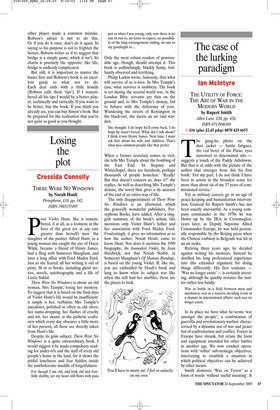Losing the plot
Cressida Connolly
THERE WERE NO WINDOWS by Norah Hoult Persephone, £10, pp. 342, ISBN 1903155495 Poor Violet Hunt. She is remembered, if at all, as a footnote in the lives of the great (or at any rate greater than herself) men: the daughter of the painter Alfred Hunt, as a young woman she caught the eye of Oscar Wilde, became a friend of Henry James, had a fling with Somerset Maugham, and later a long affair with Ford Madox Ford. Just as she feared, all her writing is out of print; 30 or so books, including ghost stories, novels, autobiography and a life of Lizzie Siddal.
There Were No Windows is about an old woman, Mrs Temple, losing her memory. To suggest that it is based on the final days of Violet Hunt’s life would be insufficient: it simply is her, verbatim. Mrs Temple’s anecdotes, polished as often as old silver; her name-dropping, her flashes of cruelty and wit, her shame at the pathetic confusion which every day obscures a little more of her present, all these are directly taken from Hunt’s life.
Despite its grim subject, There Were No Windows is a quite extraordinary book. I would suggest it be made compulsory reading for under-65s and the staff of every old people’s home in the land, for it shows the pitiful loneliness and fear hidden inside the unwholesome muddle of forgetfulness:
For though I am old, and look old and fear fully shabby, yet my heart still flows with pain just as when I was young, only now there is no one to run to, no letter to expect, no possibility of the long estrangement ending, no one to say goodnight to ...
Only the most robust readers of pensionable age, though, should attempt it. This book is unflinchingly, blackly funny, brilliantly observed and terrifying.
Philip Larkin wrote, famously, that what will survive of us is love. In Mrs Temple’s case, what survives is snobbery. The book is set during the second world war, in the London Blitz; servants are thin on the ground and, to Mrs Temple’s dismay, fail to behave with the deference of yore. Wandering the streets of Kensington in the black-out, she meets an air raid warden.
She thought: I do hope he’ll come back. I do hope he wasn’t bored. What did I talk about? I think it was Henry James. Next time, I must ask him about his wife and children. That’s what nice common people like that prefer.
When a former secretary comes to visit, she tells Mrs Temple about the bombing of the East End. ‘In Stepney and Whitechapel, there are hundreds, perhaps thousands of people homeless.’ ‘Really! But that doesn’t concern us, does it?’ she replies. As well as describing Mrs Temple’s demise, the novel thus gives a sly account of the end of an entire way of life.
The only disappointment of There Were No Windows is an afterword, which the generally wonderful publishers, Persephone Books, have added. After a sluggish summary of the book’s action, this mentions only Violet Hunt’s father and her association with Ford Madox Ford. Frustratingly, it gives no information as to how the author, Norah Hoult, came to know Hunt. Nor does it mention the 1990 biography, An Immodest Violet, by Joan Hardwick; nor that Norah Nesbit, in Somerset Maugham’s Of Human Bondage, is based on the young Violet. If, like me, you are enthralled by Hoult’s book and long to know what its subject was like when she still had her marbles, these are the places to look.
































































 Previous page
Previous page